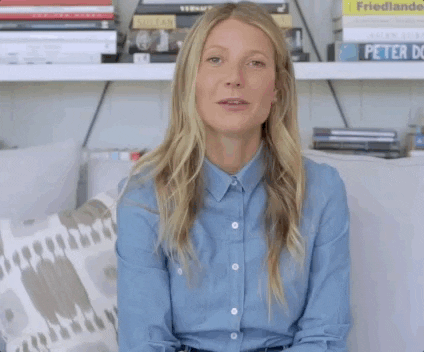The Bluestocking, vol 125: Goop, Goop Me Do
Happy . . . Saturday!
The newsletter was delayed this time by me being ill, which did mean however that I watched three (maybe four, it was a nauseous blur) episodes of Gwyneth Paltrow's The Goop Lab yesterday. It's incredible. The first one I watched was about women and sex, which was all fine and connected to material reality, but from there it got weird.
The "energy" one is unimprovable, as the Energy Master explains that he's been reluctant to have his work filmed, because "out of context, it looks absurd" (I'm paraphrasing, because please lord don't make me watch it again). He is not wrong. If you've ever wanted to watch Californians in athleisure shudder while a man waves his hands over them, you've come to the right place.

Is that witch spelled "c-h-a-n-c-e-r"?
Then there's one on mediums and psychics, in which one heroic staff member quietly insists she isn't feeling the spiritual energy being directed at her by her co-workers, and really thinks the whole thing is bollocks.

My hero.
In the same episode, in one of her sofa chats with the "experts", Gwyneth also reveals that she used to be suspicious of psychics because lots of the things they told her were quite easily Googleable. ("I'm getting... I'm getting... Brad Pitt? I'm getting... something to do with Shakespeare? The words "conscious uncoupling"?)
Unfortunately, despite the heroic resistance of that one employee, the episode concludes that REAL psychics are in fact great and something called "quintuple blind" testing (double-blind is for looooosers) has proved it to be so.
The thing is, even if the show had debunked psychics, it wouldn't have done the slightest bit of good. There's always a market for woo, and Gwyneth is the grand vizier of it. I have taken an executive decision that if people want to waste their money watching someone ineptly try to cold-read them, that's their business.
The programme is also an incredible insight into modern aspirational living. You can laugh (you will), but this is a serious business with a big turnover. The Big P, under all the chat about cleanses and new age wibble, is coining it in. In the programme, Gwyneth is obviously centre-stage, in her absurdly airy and minimalist Goop HQ in Santa Monica, filled with women who are very beautiful but not quite as beautiful as her. It looks hellish. They do yoga in the atrium. In one programme, they're forced to give each other hand massages to learn about intimacy. (One woman, forced to stare into a co-worker's eyes, starts crying. I would too.) One of the excellent recurring strands is that the few men who work for Goop seem to be in the IT department, and perhaps not coincidentally, appear to be slightly more sceptical about reiki and spiritualism than their co-workers. I like to think the door closes on the server room, and they crack open the Mountain Dew and eat nachos, like a carb-based resistance cell.
The programme is also worth watching for the frankly extraordinary outfits of the Goop staff. I am not aware of ever previously seeing people wear two shades of pink at once, and yet it occurred in consecutive episodes of The Goop Lab. The relentlessly soothing colour scheme makes the whole thing seem like some dystopian corporation, where people who look over 40 or refuse to believe in chakras get sent to the "Retraining Department" and never return.

Pink on pink.

Piiiiiiink.
You better hope I feel better soon, or this will become a Goop fan account.
Helen
My Time in the THIS! Factory
I was hired with the not so subtle understanding that there was a need for someone to write on LGBT topics and someone to write on Latino issues, and that I was “two in one.” I was and continue to be a gay Mexican. So I ran with that.
I hunted down the most terrible things that were happening to my communities and wrote them up, conjuring my own (very real) pain to make my brief posts all the more compelling. The more pain I imbued, the more dire the story became, the more people felt the need to share it and hold it up to the world as if they’d overturned a stone and found it themselves. That was the goal.
I need to write an essay with the title: "Identity politics are really identity economics."
Why Does Google Suggest "Husband" After Women's Names
To avoid my own search preferences tainting the results, I used a new browser that I don’t use at all — Firefox — in a private search tab, not logged into Google. I already knew the marital status and gender of my colleagues, but for the Harvard professors and 30 Under 30 list, I assigned gender based on first names and photos on the website. That’s an imperfect method, but it was sufficient for this relatively small sample.
For married women editors and reporters who work at BuzzFeed News, 6 out of 16 had some variation of “husband” or “wedding” as a suggested search term. Only 2 of 20 married men had “wife” as a suggested search.
I noticed this, too, when searching for pieces I've written by googling my own name. Lot of people out there who want to know if I'm married, and (tragically) I doubt it's because they want to know if this hot tamale is still on the market.
How West Side Story Was Reborn (NYT)
The movement was forceful, energized, contemporary, but it didn’t feel, to the Sharks, as if it successfully captured contemporary Latino young people. Teenagers don’t all dance in the same way, and the Sharks should have a different style than the Jets.
Some members of the cast vocalized their unease to Rudin. It wasn’t enough to have Latino people onstage playing Latino characters. “You can’t just fill a quota,” Ubeda, a first-generation Cuban-American from Miami, told me. “You have to allow us to represent actually. If there’s any reason to do it again, it’s to get it right.”
[. . .]
Two Latino dance consultants — Patricia Delgado, a ballet dancer originally from Miami, and Sergio Trujillo, a Tony Award-winning Broadway choreographer — were called in to help De Keersmaeker, together with the cast, find ways of incorporating more authentically Latino movement. In the theater world, reports about this were greeted with a derisive frisson (one website reported, inaccurately, that Trujillo was being brought in to clean up a mess and that Robbins’s choreography was being restored). But what was happening at the theater was at once more pedestrian and more complicated: Real identity politics had entered into the production’s theatrical identity politics, creating tensions that had to be resolved through dance.
I read this not long after discovering the controversy over American Dirt, another complicated story of intention, representation and potential appropriation.
The Way We Write History Has Changed
While libraries have become central actors in the digitization of knowledge, archives have generally resisted this trend. They are still almost overwhelmingly paper. Traditionally, you’d go to a place like this and sit there, day after day, “turning every page,” as the master biographer Robert Caro put it. You might spend weeks, months, or, like Caro, years working through all the boxes, taking extensive notes and making some (relatively expensive) photocopies. Fewer and fewer people have the time, money, or patience to do that. (If they ever did.) Enter the smartphone, and cheap digital photography. Instead of reading papers during an archival visit, historians can snap pictures of the documents and then look at them later.
I took a LOT of photos during the research for Difficult Women, because of time constraints. If you only have one day at a particular archive, it makes sense to maximise your yield, as it were. My question is: how many of the resulting photos actually get looked at? It can be a little bit like the research version of me thinking that buying books is the same as reading them, somehow. I've got the knowledge! I own it! Wait -
Quick Links
"That you can, as we say on the internet, just not occurs to Tolentino as a theoretical option but not an actual one." A sceptical review of Trick Mirror.
"As for where Laurence could have gone after QT, I suppose he could have donned the Black Poloneck of Poorly Essayed Contrition. I refer of course to the night that Dapper Laughs opted to become Dapper Tears, and appeared on Newsnight to apologise for “pushing the boundaries”." Classic Hyde.
Guest gif o' grift:

See you next time!

